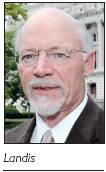Subscriber Benefit
As a subscriber you can listen to articles at work, in the car, or while you work out. Subscribe NowHammond City Judge Jeffrey Harkin represents what might signify a growing trend as the Indiana legal community copes with budget crunches and a turbulent economy.
Sitting on what he describes as the busiest and most efficient city court in Indiana, Judge Harkin is suing the Hammond City Council for slashing the court's 2009 budget by more than 10 percent, which translates to the loss of five employees.
The judge doesn't find it acceptable and thinks the cut is outside the city council's authority.
"Basically, this cut renders the court unable to maintain its efficiency," said the judge's attorney, David Weigle of Hammond. "There's a penchant for local politicians to be fiscally responsible budget cutters, but there's a broader question here of responsible budget cutting. This all seems to be politicians pandering to the residents about cutting budgets but not willing to accept the consequences of that."
 Judge Harkin's lawsuit filed Oct. 24 symbolizes the tension being seen throughout Indiana as local officials are crunching numbers and trying to figure out how to best balance budgets for the coming year, a practice that's putting the legal community in the crosshairs.
Judge Harkin's lawsuit filed Oct. 24 symbolizes the tension being seen throughout Indiana as local officials are crunching numbers and trying to figure out how to best balance budgets for the coming year, a practice that's putting the legal community in the crosshairs.
It's a guessing game for many, as some budgets aren't yet certified by the state and the full impact of sweeping property tax reform won't even be known until sometime next year. Lawsuits are being filed or threatened, officials are warring with those in the justice system who say they can't perform essential duties without adequate resources, and county courts, prosecutors, and public defenders are being forced to deal with dire funding issues for 2009 while dreading what could be an even worse situation the following year
"We cut what we needed to, but my real concern is for the year beginning in 2010," said Allen County Prosecutor Karen Richards, who cut $195,000 from her $6 million budget as all departments were ordered. "We are just able to work within these budget constraints now, but another year will be incredibly more difficult. If the economy doesn't turn around…. It's only going to get worse."
What looms is a dark cloud in a mammoth storm slamming the nation, the result of an economic crisis engulfing both the public and private sectors. While law firms scrutinize bottom lines and determine what impact economic woes will have on their practices, local governments are being forced to deal with the combination of sweeping property-tax reforms, decreasing revenue, rising costs, and overall anxiety about when the economy might rebound.
 The picture isn't good for Indiana, which faces a bleak forecast as lawmakers prepare for a long session to tackle the state's two-year budget. Economic forecasts are calling for the state to be about $600 million off its expected revenue mark, and that means legislators will have to address not only that significant shortfall but also broader, change-based issues in how government is run from top to bottom.
The picture isn't good for Indiana, which faces a bleak forecast as lawmakers prepare for a long session to tackle the state's two-year budget. Economic forecasts are calling for the state to be about $600 million off its expected revenue mark, and that means legislators will have to address not only that significant shortfall but also broader, change-based issues in how government is run from top to bottom.
Counties and local governments have until Dec. 1 to submit their approved budgets to the Indiana Department of Local Government Finance. The state agency must then certify the budgets by mid-February, and tax rates won't likely be known until mid-2009. Simultaneously, local governments are nervous about what H.E.A. 1001 will mean because it takes away a significant chunk of property tax that's traditionally served as a revenue-generator.
"We're in a pinch," said Larry Landis, executive director of the Indiana Public Defender's Council. "Everyone understood when this property tax reform was passed the full effect would be a year or two down the road. It's coming closer, and we're all going to feel it if something doesn't change."
Most public defenders are being told to expect 3 to 8 percent cuts for 2009, and the number is similar or higher for the following years, Landis said. That creates a problem for many that often operate underfunded offices with excessive caseloads but are required to meet standards to receive funding reimbursement from the state. Courts and prosecutors see the same issues when dealing with crime that tends to rise during tougher economic times.
"Crime doesn't go down because there's a recession; it instead has an inverse correlation, and it's difficult to do more with less resources," he said.
Statewide, judges and lawyers are doing what they can to make ends meet in this time of uncertainty.
 To meet a 20 percent budget reduction this year by city officials in Gary, City Judge Deidre Monroe in September gave up money she'd set aside to repair two dozen courtroom seats that are broken and unusable. Instead of using that money from 2007, the judge decided to help meet a $100,000 shortfall in the city's budget.
To meet a 20 percent budget reduction this year by city officials in Gary, City Judge Deidre Monroe in September gave up money she'd set aside to repair two dozen courtroom seats that are broken and unusable. Instead of using that money from 2007, the judge decided to help meet a $100,000 shortfall in the city's budget.
But that only does part of the job. Judge Monroe also may need to cut some of her 60 staff positions, and that could mean discontinuing at least one of the 10 court calls scheduled every week.
Marion County Public Defender Bob Hill said he's leaving several positions unfilled but doesn't have to lay anyone off. It's the same scenario on the court side, according to Marion Superior Judge Gerald Zore and Court Administrator Glenn Lawrence.
The court's $57 million budget didn't get cut, and it was able to get some additional funding for state-mandated pay increases, a new civil court opening in January, and some more juvenile medical expenses, Lawrence said. The courts asked for additional money for staff but didn't receive it, and the court is now looking at more video conferencing and technology resources to try and save money, as well as not filling any vacant positions, he said.
Hill encouraged the courts to start collecting more fees from public defense cases, which could mean almost twice as much revenue from the $160,000 collected in 2007. While the office has trimmed expenses through attrition Hill is already evaluating what can and can't be cut during next year's budget process.
"We're at a point where we can't cut anything more out of the budget," he said. "There're no fray expenses; we're doing what we can without having to cut services, which would mean we could run afoul of the public defender standards and that has serious implications."
In Vanderburgh County, officials say it wasn't as bad as it could have been.
Public Defender Stephen Owens said his $1.7 million budget showed no growth for 2009, with a slight reduction but pretty close to what it was for this year. He hasn't had any reductions in lawyers like others in the state that have seen 3 to 20 percent cuts for departments.
"Every county is in some sort of economic downturn, and that's certainly being seen this year," he said. "We're kind of better off, but not nearly as well off as we'd like to be. But the serious reductions might come next year; that's when we may really see the full force of this crunch."
 The notion of working together on budget cuts isn't something everyone is taking to heart. Judges have filed multiple funding suits through the years, but some observe the current crisis could increase that amount. The issue also recently has surfaced in Steuben and St. Joseph counties, among others.
The notion of working together on budget cuts isn't something everyone is taking to heart. Judges have filed multiple funding suits through the years, but some observe the current crisis could increase that amount. The issue also recently has surfaced in Steuben and St. Joseph counties, among others.
Judge Harkin's suit seeks a permanent injunction against the city from cutting his budget from $853,459 to $728,480 and asks the court to mandate the council appropriate sufficient funds. He'd requested an $813,779 budget for 2009.
"We think the law is pretty clear that as long as the budget isn't extravagant, which it's not, they don't have the authority to cut it," his attorney Weigle said.
The Indiana Supreme Court has ruled on the issue of judicial mandates and said trial judges and county officials must work together, as both share the responsibility of setting court budgets. The Commission on Courts earlier this year didn't reach any decision on mandates but said one possible way to resolve some of these issues could be in statewide reform of county court funding.
That idea is gaining steam in Indiana, with many pushing for restructuring that could free up county money and shift that funding responsibility to the state.
A catalyst for that realistically happening during an upcoming legislative session could be local government reform work done in the past year. Those types of reforms came in a report released late last year by a committee co-chaired by former Gov. Joe Kernan and Indiana Chief Justice Randall T. Shepard. The report suggested a flurry of government reforms, such as sweeping property tax reform that's already happening and eliminating township government offices. It also included recommendations for a possible a shift in funding from counties to the state for public defense, county courts, and probation.
"This time is difficult for local governments, especially for criminal justice agencies that are reacting to what happens in society," Landis said. "County government has to provide the funding or we can't do our jobs, unless the state decides to pick up some of the costs. This is a part of the Kernan-Shepard report, and my message would be that this is a good
Please enable JavaScript to view this content.
